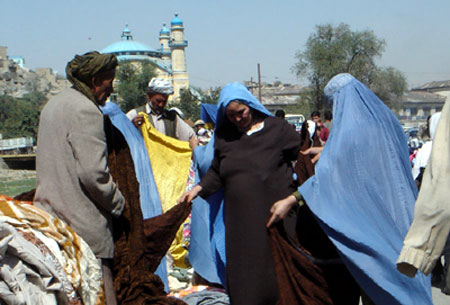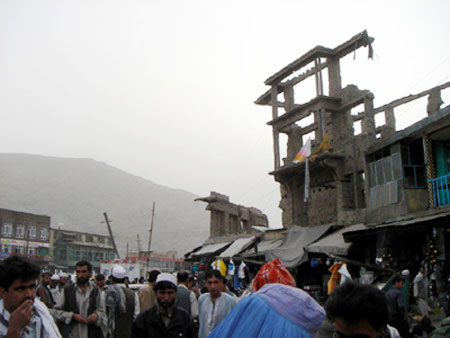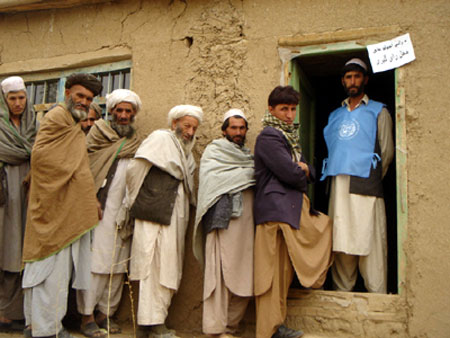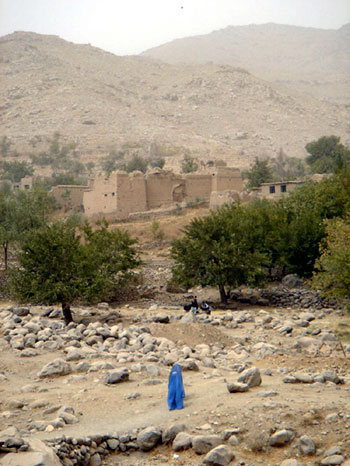
Downtown Sana. This picture captures the traditional Yemeni architecture – tall, brown buildings frosted with white trim – that dominates the cityscape.
My ears rang with an intensity that I had only experienced when walking out of a rock concert. I kept my finger on the trigger anyway. Aiming for a boulder that rested on the rock-strewn mountainside about 100 yards away, I missed wildly, sending clouds of dirt and debris into the sky. I wondered whether my hearing would ever recover. As I was learning, an AK-47 is painfully loud.
My adventure had begun earlier that afternoon when a friend, Osama, who also happens to be an officer in the Yemeni Special Forces, invited me to go out shooting guns with him in the countryside. I had been living in Sana, Yemen’s capital, for about two months on a summer fellowship to study Arabic. His offer was a kind gesture, and I needed a study break, so I figured why not.
Before I left, friends offered words of caution; others flat out told me not to go. I wasn’t so worried. The target practice itself was smooth-sailing, no problems. It was after we started packing up the guns, that things became dicey.
Why worry?
As an American in Yemen, the potential exists to be the object of an attack, but I never personally sensed any danger. I was told on several occasions, “No one would ever hurt you here. If they did, the government would capture and kill them.”
Quite the opposite, I found people to be very friendly. While disdainful of American politics, most Yemenis that I spoke to still tended to hold favorable views of America, in terms of its people and culture.
In contrast, to most Americans Yemen conjures a kaleidoscope of scary images, likely fueled by such movies as Rules of Engagement (2000), which shows the United States embassy in Sana being overrun by civilians, including women and children, brandishing semi-automatic weapons.
To be fair, Yemen has witnessed attacks targeted at Westerners over the years. In 2000, Al Qaeda militants rammed an explosives-laden dinghy into the USS Cole in Aden, killing 17 American sailors. In the 1990s, kidnappings were common. About 150 foreigners were abducted from 1996 to 2000, though only a few were harmed. The rest were treated well and returned safely. The intent was to pressure the government into meeting the kidnappers’ political demands.

Stepped terraces on the road to the Red Sea from the capital receive substantial rainfall. The cool temperatures high in the mountains give way to stifling heat as you move closer to the coastal plain.
Divided loyalties
Outside of Sana, the government’s control has historically been tenuous. Even those born and raised in the capital still profess loyalty to a large extended family that has roots in a particular village. In the countryside, most people still look askance at the military and police, preferring to resolve things on their own. The government recognizes this dynamic, and consequently, grants localities a wide degree of autonomy, in return for the communities recognizing the state’s authority.
Guns are simply part of the equation. There are an estimated 60 million small arms in the country, whose population is only 20 million. While weapons are typically confiscated at checkpoints leading into the capital, in villages and towns, it is a common sight to see men, old and young, walking around with an AK-47 slung over their shoulder. I had never seen anyone come close to firing these weapons. I began to think of them as an accoutrement, no different than a cell phone.
That afternoon, Osama picked me up in his Toyota Land Cruiser along with three of my friends. After passing a military checkpoint on the outskirts of Sana, we traversed a mountain pass. We drove for about half an hour along a nicely paved road through a valley as villages whizzed by. Rock walls neatly divvied up small farms. The lush greenness contrasted sharply with the barren, russet mountains that sloped upwards on either side. The diesel fumes, blaring horns, and hollering storekeepers of Sana felt far away. I sighed, content to get away from it all.
In one village, which consisted of about a dozen small homes and a corner store selling cigarettes and soda, we turned onto a dirt road. After rounding a bend, we came upon an outcropping atop a ridge. Getting out of the car, we took a look at the shallow ravine before us and the gently sloping mountainside a few hundred meters away.
“How do we know that we won’t by shoot someone by accident,” I asked.
Osama paused and then replied, “I’ll shoot a few rounds into the air. If someone’s out there, he’ll fire back.”
It seemed like a reasonable plan. Besides, the area was practically bare, except for some low-lying shrubs. If there were someone out there, we would know.
Five minutes lapsed, no response. So Osama, I, and my 20-something friends who were also studying Arabic for the summer in Sana, started taking turns shooting, one at a time using one of the two guns that Osama brought. Ian, a college student from Austin, Texas, endeared himself to Osama immediately since he also owned an AK-47 back home and collected other guns as well.
Fernando, a Muslim convert from California, became practically deaf right away. Words of encouragement, like “Nice shot, Fernando,” were met with puzzled looks, hand motions, and “What!?”
The last foreigner was Vincent, who was from France and had lived elsewhere in the Middle East, most recently Kuwait. He may have been the most enthusiastic among us, taking shots from about every conceivable position — down on one knee, standing up, from the hip, walking side-to-side.
I had met Osama the first week that I was in Yemen when a friend, a fellow student at the language institute, invited me to tag along to chew khat — a mildly stimulating leaf that is a staple of any social gathering — at Osama’s house. Educated at the Royal Sandhurst military academy in England, Osama speaks fluent English and owns an extensive hip-hop collection. Only in his late 20s, he has risen quickly through the officer ranks.
In some ways, he embodies the schizophrenia that many Yemeni elite display. When talking politics, he speaks with a moderate voice, impugning extremists, recognizing the common beliefs that bind Jews, Christians, and Muslims, and expressing empathy for democracy. For a second, that vernacular is so recognizable, it sounds straight out of a graduate school seminar, and the possibility to form a deep, intellectual bond feels so close. Just as quickly, without a hint of sarcasm, Osama casually remarks, “September 11 was probably a plot by the CIA and Mossad.” The disappointment is crushing.
What is unique about Osama is that, as a Special Forces officer, he has had direct involvement with the American military, with whom he now trains regularly. These close military relations are a new, post-9/11 reality. During the Cold War, without oil, Yemen was of marginal significance on an international and regional scale. Divided into North and South Yemen, the socialist south relied on the Soviet Union for military assistance. However, with the fall of communism, South Yemen was without a patron state, and the two countries unified.
Yemen’s profile rose following September 11. An acknowledged Al Qaeda presence, along with its proximity to the Horn of Africa, which was increasingly seen as a safe haven for terrorists, culminated in President Bush issuing a “with us, or against us” ultimatum, to which Yemen’s President, Ali Abdullah Saleh, agreed to ally with the United States.
Surrounded
After half an hour, we were out of bullets and it was getting dark. I had taken several pictures, and was thinking about what a great email this story would make to friends back home. I was also a bit relieved that we were packing things up, counting my blessings that no one got hurt. I have shot guns since I was a kid, but always with my father, who preached safety like it was the Gospel. I knew we were being too lax.
In about 40 minutes, I told myself, we would be back in Sana. Then we came upon a white pickup truck parked sideways, blocking us from passing. Two older men got out and approached our car dressed in typical fashion: a skirt, a button-down shirt, and a kefiyyeh draped over their shoulders. Osama met them halfway where they spoke.
Getting back into the car, Osama said, “We’ve gotta follow them.”
Assuming these men were from the local village, I could understand that they wanted to know who we were and what we were doing there. But we had a straight-forward story — just a few guys out shooting guns in the countryside — and we were leaving anyway. Besides, Osama was a military officer dressed in uniform. Couldn’t he just flash his ID? Traveling around Yemen, checkpoints are commonplace. But it was always the military stopping you. Now, the reverse was true.
We followed them for a few minutes. When we stopped, Osama got back out to talk. They were too far away for us to hear. But judging from their body language and raised voices, it was clear that the situation was not resolving itself.
Osama came back to the car with a worried look on his face. “Give me the guns,” he said. “These guys want to hold onto them. This might take awhile.”
Convinced that we hadn’t done anything wrong, the four of us sat in the back of Osama’s sport utility vehicle. None of us saw any reason to be alarmed. But watching Osama argue with the two villagers, doubt crept in. Had we done something wrong?
By now, the sun had ducked behind the mountains. Darkness was broken only by the glare of headlights, which were suddenly growing in number. I don’t remember seeing the first group arrive, but now there was a sizeable crowd, a few dozen villagers milling around. Each one carried a gun. In equal numbers, armed soldiers also began to pull up. It’s not surprising that word spread quickly. Cell phones are ubiquitous.
Osama was embroiled in a fierce argument. A few of his fellow soldiers joined, the rest walked around, talking among themselves. We couldn’t make out what anyone was saying. That didn’t stop us from tossing out a few ideas. Maybe they thought we were CIA agents, or maybe foreign jihadists — two very different possibilities, both equally unappealing.
Villagers kept poking their heads inside the front passenger’s side window, where Fernando was sitting.
“Who are you?” they asked in Arabic.
Still practically deaf, Fernando responded with a confused look, gesturing to his ears, shouting, “What? I can’t hear you!”
So long as the villagers kept a distance and focused on Osama; fear was kept at bay. But when their attention shifted towards us; that fear lurched forward. I felt a little nauseous. And to make matters worse, I really had to go to the bathroom. We decided to close the windows and lock the doors.
Two soldiers stood guard in front of our car, keeping curious villagers at bay. It was both reassuring and unnerving. I was glad they were protecting us, but it was a reminder that violent flare-ups between the military and villagers were fairly routine. The gravity of the situation was increased because everyone there was armed, not to mention the newly arrived Army truck with a 50-caliber machine gun mounted on the back.
As time passed, tension in the car ratcheted. Fernando, motioning to the unguarded side of the car that faced knee-high brush, said, “If I were them, I’d come up from here. You could spray the entire car. We wouldn’t even see them coming.”
“Shut the fuck up, Fernando,” Ian replied.
A pack of Marlboro cigarettes was passed around. I had never smoked before in my life. It felt like a good time to try one. It did nothing to calm my jitters.
Osama came back to the car, where he tried calming us down in a hushed tone, asking repeatedly if we were all right. He got on the phone again to call his commanding officer.
He must have already been on his way, because about five minutes later, a late model four-door sedan pulled up. Osama greeted him, and they went over to speak with the villagers. The situation felt improved. Soon both villagers and soldiers got back into their cars.
Osama arrived back at the car, holding his two guns that had been returned. Military pickup trucks filed in front of and behind us, forming a convoy to leave the area.
We peppered Osama with questions, trying to understand what had just transpired. Were they insulted by our presence on their land? Did they not believe that we were just students out shooting for the afternoon? Had we done something wrong?
Unfortunately, Osama was in no mood to explain what had happened. He just kept saying how much trouble he was in, and how he might have to go before a court martial.
Then Osama said that we had to go the Ministry of Interior, which he likened to the FBI.
“They heard what happened, and are going to have some questions for us,” he told us.

Men often gather in the afternoons to chew khat, a plant grown in Yemen and East Africa. You chew the leaves, shoots, and stems, which releases a mild amphetamine. Here, several prominent journalists gather every Monday afternoon at the home of a former member of Parliament to discuss the news of the day.
Debriefing
The interior ministry is headed by Ahmad Saleh, the eldest son of President Ali Abdullah Saleh. I didn’t know much about him, except that he is widely rumored to be next in line when the president steps aside.
When Osama said that we were going to his office, it was clear that a bizarre situation was about to get even more bizarre. On one hand, the refrain I heard so often echoed through my head. You are an American. Yemen’s government protects Americans. But maybe all that talk about the government protecting Americans was just a bunch of talk, and when it came down to it, if we really were guilty of something, we still might be in trouble. We could plead ignorance, but that defense could fall on deaf ears. Either way, I had no idea what was in store.
After emptying our pockets at the security shack just inside of the gates of the ministry, we proceeded to a second floor outer chamber. After a short wait, the door opened, and we were led inside a sleek, spacious office.
Mandatory handshakes were exchanged, and we took a seat on a couch. Across from us sat three villagers, whom I recognized as having been particularly vocal before. In between us was Ahmad, who sat at his desk, along with two advisors. He wore a white polo shirt, tight dark jeans, and a revolver on his belt. Behind him hung a portrait of his father. Displayed in an otherwise empty bookcase was President Clinton’s autobiography.
Increasingly tired, I couldn’t muster the energy to figure out what everyone was saying. The tone was light-hearted. No one yelled. It felt civilized. Occasionally, one of the advisers, a rotund man wearing Velcro sneakers, looked my direction and gave a smile. My inclination that indeed nothing would happen to us was slowly being confirmed.
The villagers did most of the talking. Ahmad asked them questions, and then turned to Osama and did the same. Though at times Osama looked exasperated, as if his point wasn’t being fully conveyed, the overall mood felt relaxed. I thought everything was going to be fine.
The improbability of the whole situation — to be sitting in the office of the president’s son — dawned on me. Looking at the villagers across from me, I wondered if they thought the same thing. Were they as surprised as I was to be sitting here?
I tried suppressing the anger I felt toward them. Maybe they had reasons for sparking this conflict, but it felt like they had overreacted and didn’t really understand who we were. As long as we got off, then I would be willing to overlook what they had done.
After fifteen minutes, there was a lull in the conversation. Ahmad turned to us, and said in perfect English, “How are you, guys? I’m so sorry for this. You must be tired. If you’d like, you can go home now.”
“Actually, we’d like to stay with Osama,” Vincent replied.
An awkward paused followed. Ahmad glanced to us and smiled. “That won’t be possible. Osama, tell them where you’re going tonight.”
Osama, to our surprise, looked like he was about to lose it. Fighting back tears, he said, “I’m going to jail.” Ahmad interjected in a calm, yet pejorative tone, “Osama needs to learn a thing or two about Yemeni culture.” I had no clue what he meant by that.
The villagers beamed triumphantly from ear to ear. They stood up and shook everyone’s hand before leaving. I did so grudgingly. I wanted to punch them in the face.
After we sat back down again, Ahmad explained to us the villagers’ side of the story. They had seen us from afar when we were shooting guns and wanted to escort us back to Sana to make sure that we arrived safely. They also asserted that Osama was holding us against our wishes, as if he had abducted us.
It was preposterous. But at least it was becoming clear to me what had really transpired. The villagers insisted on taking us back to Sana, and Osama refused. That was the dispute. The villagers took away our guns and called in as many of their men as they could. Osama did the same. Ironically, the military and villagers were really arguing over who would take us back to the capital. It could have turned violent, but no one intended to harm us.
I doubted that the villagers really believed their own story. More likely, by delivering us from “danger,” they were really looking for a quid pro quo, hoping that the government would reciprocate their good deed with maybe a new school or bridge.
It was time for us to speak up. Vincent went first, setting the record straight, and explaining that Osama was really a dear friend. Each of us followed. It felt good to come to Osama’s defense.
Ahmad listened. At times, he drifted off to look at his computer or the news broadcast on the flat screen television next to us. Judging from his disinterest, it didn’t look like we were telling him anything that he hadn’t already figured out.
When we finished, he apologized again and then wished us a good night. The five of us left, including Osama.
It was after midnight. We decided to go to the Kentucky Fried Chicken to unwind a bit. Sitting outside in the playground next to a rare patch of grass, we talked things over.
“Ahmad had to do that.” Osama explained. “It was all a show for the villagers, to make them think that I was going to jail and that they had done a good thing.”
As Osama recounted, Ahmad did not want to anger the villagers by challenging their side of the story. So he sat and listened. He thanked them for making sure that we were safe while on their land. To make it complete, he had to punish Osama to satisfy them. He really understood what had gone on, but he had to pay lip service to the villagers out of respect.
Looking back, in the heat of the moment when we were stuck in Osama’s car, it was impossible for me to imagine anything except that they were a bunch of angry villagers, upset at Americans for trespassing.
In fact, what I had witnessed had very little to do with me. It was all about Yemeni politics and the delicate balance of power between the capital and countryside that comprises the country. Harming foreigners made little sense, but coming to their rescue could pay off huge. The villagers knew this. I didn’t. A combination of guns, darkness, and a language that I am just beginning to understand, all served to obscure an unfamiliar political landscape.
STORY INDEX
MARKETPLACE>
Purchase this book through Powells.com and a portion of the proceeds benefit InTheFray
Yemen: the Unknown Arabia by Tim Mackintosh-Smith
URL: http://www.powells.com/cgi-bin/partner?partner_id=28164&cgi=product&isbn=1585671398
ORGANIZATIONS>
American Institute for Yemen Studies
URL: http://www.aiys.org/
TOPICS > YEMEN>
A guide to all things Yemen
URL: http://www.al-bab.com/yemen/
In The Fray Contributor
Dear Reader,
In The Fray is a nonprofit staffed by volunteers. If you liked this piece, could you
please donate $10? If you want to help, you can also:


















